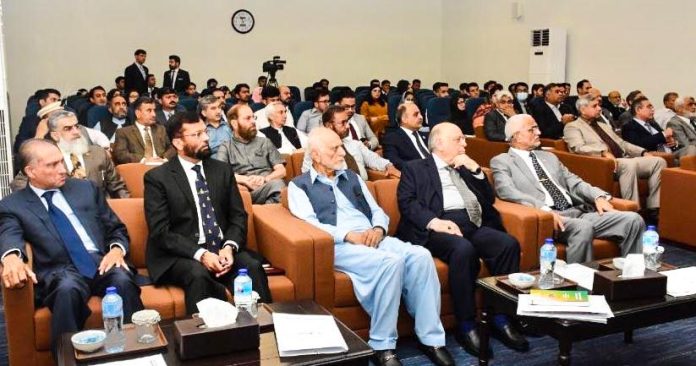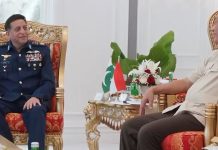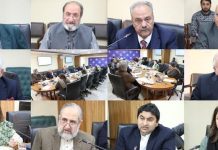ISLAMABAD, JUN 1 /DNA/ – Grant GB ‘provisional province’ status was the unanimous recommendation of the seminar on ‘Gilgit-Baltistan in National Security Calculus’ organised by the Centre for Aerospace & Security Studies (CASS) in Islamabad. The discussion focused on the current political status of GB, its role in securing China-Pakistan Economic Corridor (CPEC), its linkage with the Jammu & Kashmir dispute and recommended a way forward according to the aspirations of the people of the region.
Eminent speakers included Major General Dr Ehsan Mehmood Khan, Director General, Institute for Strategic Studies, Research & Analysis (ISSRA); Mr. Afzal Ali Shigri, Former Inspector General, Police Service of Pakistan; Justice Syed Manzoor Gillani, former Chief Justice Supreme Court and High Court, Azad Jammu and Kashmir (AJK); Ambassador Aizaz Ahmad Chaudhry, Director General, Institute of Strategic Studies Islamabad (ISSI). The seminar was chaired by President CASS Air Marshal Farhat Hussain Khan (Retd), while Asad Ullah Khan, Senior Researcher at the Centre moderated the proceedings.
While delivering the Opening Address, Air Marshal Farhat Hussain Khan highlighted that proximity with Afghanistan, China, IIOJK and AJK made GB strategically important. The President lamented that despite the seven-decade old desire of its populace and firm commitments by all three major political parties of Pakistan, GB was neither a province of Pakistan nor part of the federation. The people of GB continue to be deprived of their basic fundamental rights granted to all citizens and were not stakeholders in any decision-making in the country. ‘By ignoring the wishes of the people of GB, in this information age, the state of Pakistan unintentionally may be creating various fault lines, including alienation of its people, that could be exploited by the enemy and impact Pakistan’s national security and security of CPEC,’ he warned.
In his Keynote Address, Major General Dr Ehsan Mehmood Khan provided an in-depth assessment of national security, its various contours and linked it to the geographic, cultural, historical, and geostrategic significance of GB. He pointed out that GB was a heterogenous region marked by ethnic, linguistic, and sectarian diversities rather than differences. According to him, geographically and culturally, the region was a natural part of Pakistan. Major General Khan also discussed GB’s role in national defence as the region is Pakistan’s mountainous and glacial frontier with a history of belligerence from India. In his assessment, GB provided all-weather connectivity for CPEC and shared that Maqpon Das was a vital Special Economic Zone apart from other tourist and fruit processing zones. The Keynote Speaker was of the view that the positive role of GB’s youth in Pakistan’s development should not be underestimated given its highest literacy rate as well as their emphatic denunciation of sectarianism and violence through educational activism. The ‘national security of Pakistan is inextricably linked with GB’, he concluded.
Discussing the socio-political dimensions of GB, Mr. Afzal Ali Shigri stated that given the constitutional limbo, there was lack of interest in GB’s development and allocation of adequate resources. He stressed that although tourism had generated many employment opportunities, a lack of attention to environmental protection was destroying the region’s natural beauty. Mr Shigri reasserted that the unique movement in GB demanding to accede to Pakistan had remained resolute and unwavering. However, he warned that this sentiment could change with the current generation, as they were ‘stateless’ and ‘stateless’ people could be very dangerous.
Outlining the legal and cconstitutional aspects, Syed Manzoor Gillani agreed that GB and AJK had been ignored by the policymakers of Pakistan; and pointed out that there wereno legal or historical impediments, even as far as United Nations resolutions were concernedfor Pakistan to streamline GB in its national strata and give the later constitutional protection.
According to the speaker ‘Any interim or provisional arrangement, subject to Article 257, would in no way conflict with the UN resolutions, nor create any impediment or weaken the stand of Pakistan for the resolution of Kashmir dispute at any level, by any stretch of jurisprudence.’
Assimilation of GB and AJK in the socioeconomic and constitutional fabric of Pakistan was a need of the hour as they lacked constitutional protection that gave leverage to India for occupying territories of these regions, he said.
On the issue of Pakistan’s diplomatic stance, Ambassador Aizaz Ahmad Chaudhry shared that he had always held the stance that integrating GB would not have diplomatic or legal implications for Pakistan. The formula, in his view, was simple, ‘give GB provisional status subject to final settlement as per UN Resolutions’, especially since people of GB were already fully assimilated and serving the nation in every capacity. According to the Ambassador, at the moment, GB does not figure in the constitution which is why one prevailing Indian narrative was that Pakistan is ‘fuzzy’ about GB. He opined that ‘Pakistan should not worry about what India thinks or does not think since India has not implemented any UN Resolutions’ rather has been blatantly violating them. ‘India is on a trajectory in which it wants the Kashmir Resolution and Kashmir dispute to be dissolved,’ he warned. He urged that Pakistan should ‘secure what it has and put a claim on what India has forcefully occupied’ as every nation fights for its own interests on its own. To improve its narrative, Pakistan should initiate regional plebiscite in GB, the speaker recommended and reiterated that GB should be integrated immediately as Pakistan was already too late on this front and the same provisions should be offered to AJK as well.
While delivering the Concluding Address, President CASS Air Marshal Farhat Hussain Khan restated the panel’s consensus that as per the recommendation of Sartaj Aziz Committee of 2017 and the decision of Supreme Court of Pakistan of January 2019, GB be given status of a ‘provisional province’ and AJK should also be given the same option since there was no national or international hurdle to stop this. However, it was important to improve the state’s narrative on the issue to counter the Indian narrative. ‘The people must be empowered and made stakeholders in our society. They are equally good Pakistanis as anyone else and we appreciate their patience over the past 75 years’, he concluded.
The seminar was attended by scholars, journalists and students belonging to Gilgit-Baltistan, who actively participated in the interactive question and answer session.

















